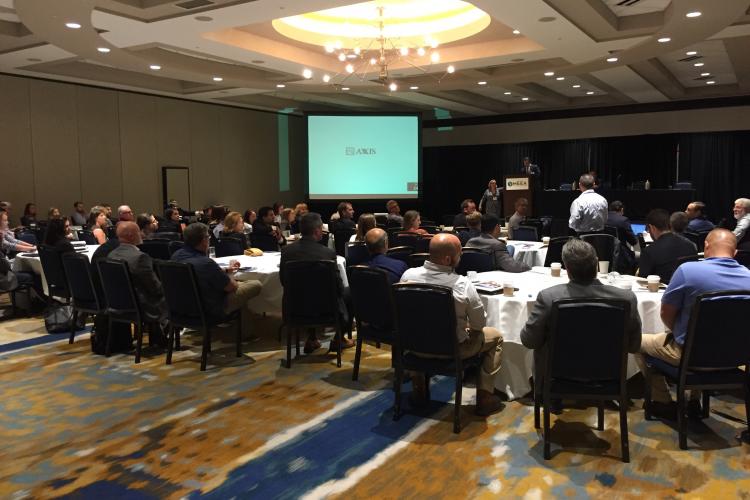
On June 20-21, MEEA members from across the country united for the Annual Meeting of the Membership in Louisville, KY. Fueled by hot browns and watermelon salad, MEEA members swapped ideas, strengthened relationships and looked ahead at the coming year in energy efficiency.
Pre-Events
The festivities started Wednesday, June 20 with a meeting of board members running concurrent to a workshop for early arriving attendees. The workshop “To Efficiency and Beyond” placed a spotlight on distributed energy resources (DERs) including microgrids, electric vehicles, data analytics and more. Experts from DNV GL, University of Illinois – Energy Resources Center, First Fuel, Oracle and D+R International discussed DERs as they relate to resiliency and demand response opportunities.
The evening capped off with a networking reception over bocce and bourbon at the Tavern on Fourth.
Board Elections
After early morning yoga and running, the Annual Meeting began with introductions, updates about MEEA’s work and board elections. This year, board members Michael Brandt (ComEd), Brenda Wilbers (Missouri Dept. of Economic Development) and Rick Morgan (Morgan Marketing Partners) are rolling off, and we thank them for their outstanding board service.
MEEA members voted to approve the slate of candidates:
- Nick Mark, CenterPoint Energy
- Scott Drake, East Kentucky Power Cooperative
- John Nicol, Leidos
- Sam Mueller, Nexant
- Jim Jerozal, Nicor Gas
- Dan York, ACEEE
- Nathan Baer, Staples Energy
- Shawn White, Xcel Energy
- Stefano Galiasso, Energy Resources Center*
- Anthony Fryer, Minnesota Dept. of Commerce*
- Brandon Renaud, Columbia Water & Light *
- John Boladian, DTE Energy*
- E’Lois Thomas, SEEL*
- Eric Flower, The Weidt Group*
* new additions to the board
See the full list of board members here.
MEEA board members then walked through the organization’s major endeavors and financial standing. As Executive Director Stacey Paradis highlighted, MEEA is embarking on several exciting projects, including a Diversity and Inclusion Initiative and survey and a new strategic plan.
Current Challenges to EE Policies: What Does this Mean for the Future?
The morning’s policy session began with a high-level look at the region’s political makeup. MEEA’s 13-state map is heavily red, with 12 Republican governors (Minnesota’s Mark Dayton is the lone Democrat) and 11 Republican legislatures (Illinois has a Democratic majority, and Nebraska’s is nonpartisan). Term limits and competitive elections could change the map, however, as 4-9 new governors will be elected this fall.
Samantha Williams (NRDC), Marty Kushler (ACEEE) and Ray Fakhoury (Advanced Energy Economy) explored the positive impacts of the Future Energy Jobs Act in Illinois and EE policy successes in Michigan. Panelists then turned their attention to Ohio, where years of uncertainty have threatened energy efficiency standards. After surviving a freeze and attempts at rollbacks, Ohio’s EE standard endured with support from Gov. John Kasich. But HB 114, currently under consideration, has once again put EE standards in the crosshairs with an expanded opt-out.
Breakout Sessions
After lunch, the meeting finished with three breakout sessions: a utility R&D meeting, a workshop on Income-Qualified Program Delivery, and the Policy Advocacy Simulator.
In the Policy Advocacy Simulator, participants took sides on a fictional energy bill in the state legislature and made advocacy plans to either advance or stymie the bill’s progress. Groups chose key messages, determined communications needs, identified allies and opponents and responded nimbly to a dastardly mid-round twist.
This year, MEEA began holding stakeholder collaboratives in Illinois, Michigan and Missouri around program design and delivery for income-qualified customers. The Annual Meeting’s Income Qualified EE Workshop built on these efforts to explore common challenges and solutions when designing and delivering these programs. Participants strategized how to meet the needs of income qualified customers while expanding participation and helping utilities achieve their savings goals.
Conclusion
Thank you to all the members who attended, our panelists and board members for making this event a tremendous success.